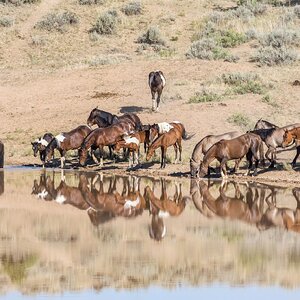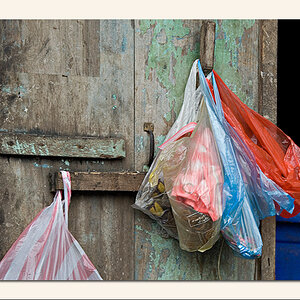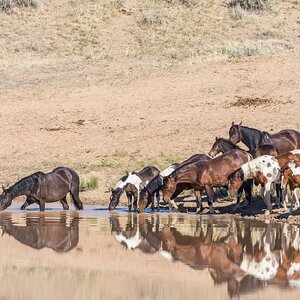cigrainger
TPF Noob!
- Joined
- Feb 2, 2007
- Messages
- 480
- Reaction score
- 1
- Website
- www.flickr.com
- Can others edit my Photos
- Photos NOT OK to edit
As of late, I've been increasingly disgusted with my digital results, in favor of the (to me) "more natural" look of film. Sure, digital is more convenient, but PERSONALLY (I don't want to debate over this), I like the look of film more. I like grains over pixels.
Problem is, film is just so darn EXPENSIVE. I know, I know, digital costs more right off the bat, and factor in a computer and blah blah. But I already have a computer, and since I needed a printer for university anyway, it wasn't that expensive to grab a photo printer.
My issue is, as a university student, I'm spending anywhere between £2 and £5 (b/w or color respectively) on film, and then I have to get it processed. My local processing place does good work, but it can be hit or miss. Altogether for black and white or print film, I end up spending at least £10 a roll if you factor in film, development, and scanning. Not to mention the fact that I have rheumatic fever (of all things) and it's a bit of a pain for me to walk to the processing place just for film development.
I'm just frustrated.
So tell me if this is a good idea:
Next year, when I move into my new flat, I'm going to get permission from my landlord to lightproof our storage room by putting up lightproof black cloth around the door.
I'm going to then buy all the stuff needed to develop (not print) my black and white film.
I'm going to then buy Kodak Tri-X or Ilford HP4 (haven't decided which I like better yet) in bulk rolls, and buy some refillable cartridges.
I'm going to buy a decent film scanner (at least like 4600dpi).
This way, because I shoot lots of black and white, after the initial setup cost I will be spending less than the regular cost of film per roll.
If I decide I like certain shots, I can head down to my university darkroom and make enlargements (its too far away to be reasonable to develop there all the time, I know what you're thinking).
I can walk down the street (I'm going to be broke, there are about 4 used camera shops within a 10 min walk of my new flat with awesome stuff) and get my slide film developed/mounted (not printed) and I can scan it at home.
If I decide I like certain shots, my university has a color darkroom as well.
Does this seem like the most cost effective/reasonable thing to do? I'm not sure I want to mess with color developer because I've heard it's more dangerous than b/w developer. Is it? Could I just develop my color stuff at home too?
Problem is, film is just so darn EXPENSIVE. I know, I know, digital costs more right off the bat, and factor in a computer and blah blah. But I already have a computer, and since I needed a printer for university anyway, it wasn't that expensive to grab a photo printer.
My issue is, as a university student, I'm spending anywhere between £2 and £5 (b/w or color respectively) on film, and then I have to get it processed. My local processing place does good work, but it can be hit or miss. Altogether for black and white or print film, I end up spending at least £10 a roll if you factor in film, development, and scanning. Not to mention the fact that I have rheumatic fever (of all things) and it's a bit of a pain for me to walk to the processing place just for film development.
I'm just frustrated.
So tell me if this is a good idea:
Next year, when I move into my new flat, I'm going to get permission from my landlord to lightproof our storage room by putting up lightproof black cloth around the door.
I'm going to then buy all the stuff needed to develop (not print) my black and white film.
I'm going to then buy Kodak Tri-X or Ilford HP4 (haven't decided which I like better yet) in bulk rolls, and buy some refillable cartridges.
I'm going to buy a decent film scanner (at least like 4600dpi).
This way, because I shoot lots of black and white, after the initial setup cost I will be spending less than the regular cost of film per roll.
If I decide I like certain shots, I can head down to my university darkroom and make enlargements (its too far away to be reasonable to develop there all the time, I know what you're thinking).
I can walk down the street (I'm going to be broke, there are about 4 used camera shops within a 10 min walk of my new flat with awesome stuff) and get my slide film developed/mounted (not printed) and I can scan it at home.
If I decide I like certain shots, my university has a color darkroom as well.
Does this seem like the most cost effective/reasonable thing to do? I'm not sure I want to mess with color developer because I've heard it's more dangerous than b/w developer. Is it? Could I just develop my color stuff at home too?


![[No title]](/data/xfmg/thumbnail/38/38738-7933157d1b8968c986eeeab2d1828524.jpg?1619738703)
![[No title]](/data/xfmg/thumbnail/38/38737-350089c7ae87f5c983c5362b9b78b671.jpg?1619738703)









